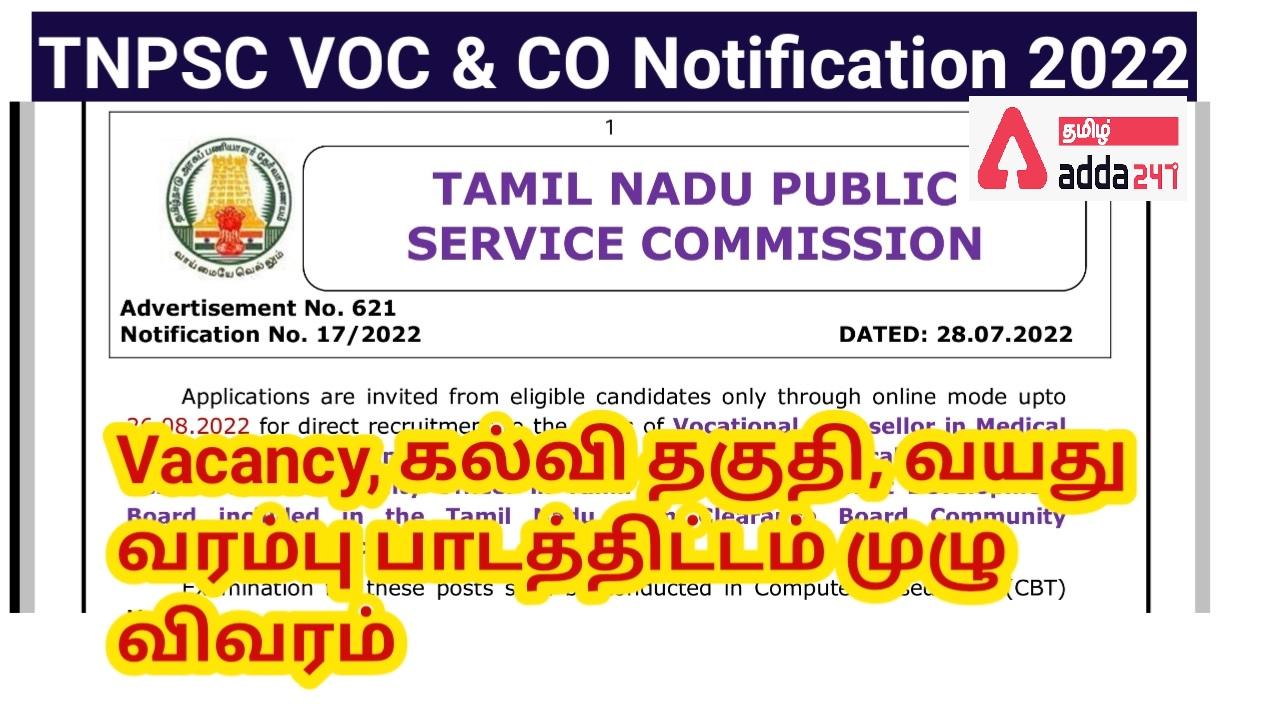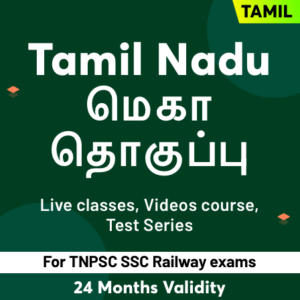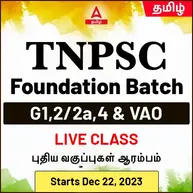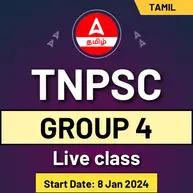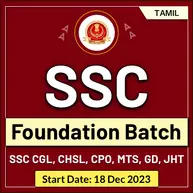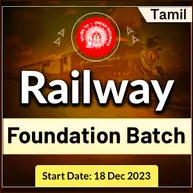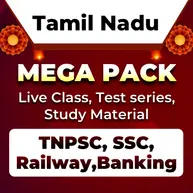Table of Contents
TNPSC Recruitment 2022: Tamil Nadu Public Service Commission (TNPSC) is inviting Online Application from Candidates for Vocational Counsellor in Medical Education Department and Community Officer Post. TNPSC Recruitment 2022 notification was announced on 28.07.2022. Masters Degree, PG Degree candidates can apply for 16 vacancies in Tamil Nadu . Applications are invited from eligible applicants. Therefore, those who are eligible and interested should apply online by 26.08.2022. Read the article to get full details about TNPSC Recruitment 2022.
Fill the Form and Get All The Latest Job Alerts
| TNPSC VOC and CO Recruitment 2022 | |
|---|---|
| Organization | Tamil Nadu Public Service Commission – TNPSC |
| Job Category | State Govt Job |
| Job Role | Vocational Counsellor in Medical Education Department and Community Officer |
| Qualification | Masters Degree, PG Degree |
| Total Vacancy | 16 Post |
| Job Location | Tamil Nadu |
| Salary | Rs.35,600 to 1,33,100 (per month) |
| Starting Date | 28.07.2022 |
| Last Date | 26.08.2022 |
| Apply Mode | Online |
TNPSC Recruitment 2022
தமிழ்நாடு அரசுப் பணியாளர் தேர்வாணையம் (TNPSC) மருத்துவக் கல்வித் துறையில் தொழிற்கல்வி ஆலோசகர் மற்றும் சமூக அலுவலர் பதவிக்கு விண்ணப்பிப்பவர்களிடமிருந்து ஆன்லைன் மூலம் விண்ணப்பங்களை வரவேற்கிறது. TNPSC ஆட்சேர்ப்பு 2022 அறிவிப்பு 28.07.2022 அன்று அறிவிக்கப்பட்டது. முதுகலை பட்டம், முதுகலை பட்டப்படிப்பு வேட்பாளர்கள் தமிழகத்தில் 16 காலியிடங்களுக்கு விண்ணப்பிக்கலாம். தகுதியான விண்ணப்பதாரர்களிடமிருந்து விண்ணப்பங்கள் வரவேற்கப்படுகின்றன. எனவே, தகுதியும் விருப்பமும் உள்ளவர்கள் 26.08.2022க்குள் ஆன்லைனில் விண்ணப்பிக்கவும்.
TNPSC Field Surveyor & Draftsman Notification 2022
TNPSC Recruitment 2022 Notification PDF
தமிழ்நாடு அரசுப் பணியாளர் தேர்வாணையம், தமிழ்நாடு மருத்துவக் கல்வித் துறையில் உள்ள தொழிற்கல்வி ஆலோசகர் பதவிக்கு தகுதியான விண்ணப்பதாரர்களை அழைக்கிறது. TNPSC ஆட்சேர்ப்பு 2022 அறிவிப்பைப் பதிவிறக்க கீழே உள்ள PDF இணைப்பைப் பதிவிறக்கவும்.
TNPSC Recruitment 2022 Notification PDF for VOC & CO – English
TNPSC Recruitment 2022 Notification PDF for VOC & CO – Tamil
TNPSC Recruitment 2022 Vacancy
TNPSC ஆட்சேர்ப்பு 2022 அறிவிப்பு 28.07.2022 அன்று அறிவிக்கப்பட்டது. முதுகலை பட்டம், முதுகலை பட்டப்படிப்பு வேட்பாளர்கள் தமிழகத்தில் 16 காலியிடங்களுக்கு விண்ணப்பிக்கலாம்.
| Name of the Posts | No. Of.Posts |
| Vocational Counsellor | 5 |
| Community Officer | 11 |
Read More: TNUSRB SI Exam Result 2022, Merit List & Cut Off Marks
TNPSC Recruitment 2022 Education Qualification
பதவிக்கு விண்ணப்பிப்பதற்கான தகுதி மருத்துவம் மற்றும் மனநல சமூகப் பணியை சிறப்புப் பாடமாகக் கொண்ட சமூகப் பணியில் முதுகலைப் பட்டம்/முதுகலைப் பட்டம் பெற்றிருக்க வேண்டும்.
வேலைக்கு விண்ணப்பிக்க, அரசாங்கத்தின் ஏதேனும் ஒரு துறை அல்லது பதிவு செய்யப்பட்ட அரசு சாரா நிறுவனத்தில் சமூக நலத் துறையில் குறைந்தபட்சம் 2 ஆண்டுகள் அனுபவம் பெற்றிருக்க வேண்டும்.
விண்ணப்பதாரர்கள் தமிழில் போதுமான அறிவு பெற்றிருக்க வேண்டும்
| Post Name | Qualification |
| Vocational Counsellor | Post Graduation in Social Work |
| Community Officer | Masters Degree in Social Work |
Read More: TNPSC Result Date Schedule 2022
TNPSC Recruitment 2022 Age Limit
- பொதுப் பிரிவினருக்கு அதிகபட்ச வயது வரம்பு 32 ஆகும்
- ஒதுக்கப்பட்ட பிரிவினருக்கு வயது வரம்பு இல்லை (SCs, SC(A)s, STs, MBC/DCs, BC(OBCM)s, BCMs மற்றும் அனைத்து வகைகளின் ஆதரவற்ற விதவைகள்)
- அதிகாரப்பூர்வ அறிவிப்பில் குறிப்பிடப்பட்டுள்ளபடி வயதுச் சலுகை வழங்கப்படும்.
TNPSC Recruitment 2022 Apply Online
தமிழ்நாடு அரசுப் பணியாளர் தேர்வாணையம், தமிழ்நாடு VOC & CO பணிகளுக்கான ஆட்சேர்ப்பு அறிவிப்பை வெளியிட்டுள்ளது. கீழே உள்ள லிங்க்கை கிளிக் செய்து TNPSC VOC & CO பணிக்கு விண்ணப்பிக்கலாம்
TNPSC Recruitment 2022 VOC & CO Apply Online
TNPSC Recruitment 2022 Application fee
| a. | Registration Fee:
For One Time Registration [G.O.(Ms).No. 32, Personnel and Administrative Reforms (M) Department, dated 01.03.2017] Note: Applicants who have already registered in One Time online Registration system and within the validity period of 5 years are exempted |
Rs.150/- |
| b. | Examination Fee:
Note: The Examination fee should be paid at the time of submitting the online application for this recruitment if they are not eligible for the concession noted below. |
Rs.100/- |
| Note: Fee Pay by online through Net Banking / Credit card / Debit card on or before the date of submission of online application by choosing the option in the online application. | ||
TNPSC Recruitment 2022 Selection Process
- கணினி அடிப்படையிலான தேர்வு (CBT) முறையில் நடத்தப்படும் தேர்வின் மூலம் விண்ணப்பதாரர்கள் நியமிக்கப்படுவார்கள்.
- மொத்தம் 450 மதிப்பெண்களுக்கு தேர்வு நடைபெறும். மற்ற தேர்வு விவரங்கள் அதிகாரப்பூர்வ அறிவிப்பில் வழங்கப்பட்டுள்ளன.
- விண்ணப்பதாரர்கள் கீழே குறிப்பிடப்பட்டுள்ள படிவத்தில் உடல் தகுதி சான்றிதழை சமர்ப்பிக்க வேண்டும்.
TNPSC Recruitment 2022 Salary Details
| Post Name | Salary Details |
|---|---|
| Vocational Counsellor | Rs.36,200 – 1,33,100/- |
| Community Officer | Rs.35,600 – 1,30,800/- |
How to Apply for TNPSC Recruitment 2022
1.தமிழ்நாடு அரசுப் பணியாளர் தேர்வாணையத்தின் அதிகாரப்பூர்வ இணையதளத்திற்குச் செல்லவும் – TNPSC ‘ஆட்சேர்ப்பு -> தொழில் -> விளம்பர மெனு’ இணைப்பைக் கண்டுபிடித்து, அதைக் கிளிக் செய்யவும்.
2.அல்லது மாற்றாக, இறுதியில் வழங்கப்பட்ட இணைப்பிலிருந்து அதிகாரப்பூர்வ அறிவிப்பைப் பதிவிறக்கவும்.
3.உத்தியோகபூர்வ அறிவிப்புகளை கவனமாகப் படித்து, உங்கள் தகுதி வரம்புகளைச் சரிபார்க்கவும்.
4.கீழே உள்ள அதிகாரப்பூர்வ ஆன்லைன் விண்ணப்ப / பதிவு இணைப்பைப் பார்வையிடவும்.
5.தேவையான விவரங்களை சரியாக நிரப்பவும். தேவையான அனைத்து ஆவணங்களையும் அறிவிக்கப்பட்ட வடிவம் மற்றும் அளவுகளில் பதிவேற்றவும்.
6.இறுதியாக, பதிவு செய்யப்பட்ட விவரங்கள் சரியானவை மற்றும் துல்லியமானவை என்பதைச் சரிபார்த்து, பின்னர் சமர்ப்பிக்கவும்.
7.அடுத்து, கேட்கப்பட்டால், அறிவிக்கப்பட்ட பயன்முறையின்படி பணம் செலுத்துங்கள்.
8.இல்லையெனில், அடுத்த கட்டத்திற்கு செல்லவும்.
9.விண்ணப்பத்தைச் சமர்ப்பித்து, எதிர்காலக் குறிப்புக்காக உங்கள் விண்ணப்பப் படிவத்தை பிரிண்ட் அவுட் எடுக்கவும்.
Disaster Management | பேரிடர் மேலாண்மை
TNPSC Recruitment 2022 Syllabus
SYLLABUS FOR EXAMINATION (CBT Method)
SOCIAL WORK
P.G DEGREE STANDARD
UNIT-I: SOCIAL WORK PROFESSION
Definition and meaning; historical evolution of Social Work – UK, USA and India; Growth of Social Work as a Profession; Social Work concepts, methods, fields; international and national professional bodies/ forums; status and problems of the profession in India.
Social Work ideologies: socialism, marxism, equality, equity, social justice and humanitarianism; Indian socio-cultural and religious thought, social reforms purusharthas; Gandhian Social Work; contributions of religions- Hinduism, Buddhism, Jainism, Islam and Christianity; Rights based approach.
Philosophy of Social Work Profession – values, beliefs, principles and code of ethics; Social Work theories; International Social Work – basic concepts, Global Agenda and Global standards for practice; Human Rights and Social Work; Constitutional safeguards; India as a welfare state; role and contributions of voluntary organizations, INGOs, NGOs and CSOs.
UNIT-II: FUNDAMENTALS OF SOCIOLOGY AND PSYCHOLOGY
Sociology: Definition, meaning, scope and relevance to social work; basic sociological concepts: Society-meaning, definition and types, structure, features; social institutions; concept of social system and sub system, classification of social systems, culture: concept, characteristics, social stratification, social processes- social control, social change in India, social movements, crime and delinquency; social problems-poverty, inequality, casteism, causes and consequences.
Psychology: Definition, meaning and scope, Psychology and Social Work; lifespan, phases of human growth and development, (Erik Erikson and Freud) needs, tasks and challenges, influence of hereditary and environment; psychological processes for understanding behaviour, intelligence, sensation, emotions, learning, memory, attitudes, behaviour, perceptions and prejudices; life events and their impact on behaviour.
UNIT-III: DIRECT METHODS OF SOCIAL WORK PRACTICE–I
Social Case Work: Historical development, CW as a direct method of Social Work, definition and meaning, philosophy, values, principles, skills, components of social case work, case work relationship; empathy, skills in building relationship, transference and counter transference; difference between casework, counseling and psychotherapy for different target groups, the helping process, approaches: Skills-referrals, interview, observation, collateral contact; types of recording, application of CW in various settings; limitations of the method.
Social Group Work: Definition of group, types, and characteristics of groups; Historical development of GW as a direct method in Social Work, definition and meaning, purpose, objectives, values, skills, principles of GW,phases of group work process-group processes and dynamics-stages in group development, the influence of new comers on group processes, isolation, rejection in groups, group-bond, subgroups, clique, dyad, triad, group norms, group membership, group cohesiveness, group pressure, group morale, leadership, team building, decision making, problem solving, conflict management, communication; role clarity in a group; use of sociometry; Group Work models; social goals model, remedial model, reciprocal model, Application in various settings; types of recording in Group Work.
UNIT-IV: DIRECT METHODS OF SOCIAL WORK PRACTICE–II
Community Organisation: Definition, philosophy, principles, goals, scope of CO; community as a social system; subsystems; types and characteristics community power structure, community dynamics, evolution of CO as a direct method in social work, community organization models: Rothman- social planning, locality development and social action; Murray Ross-general content, specific content and process objective; process and skills in community organisation.
Social Action: Concept, definition, aims and objectives, scope, social action as a method in social work, paradigm of five elements: causes, change agent, change target, change channels, change strategy, strategies and tactics for social action: channels topology; skills of a social activist, models and approaches to social action: Paulo Freire- Martin Luther King ,Saul Alinsky, social action movements in India- Narmada Bachao Andolan, Chipko movement, Dalit movements, women’s movements, Contemporary Social Reforms movement.
UNIT-V: INDIRECT METHODS OF SOCIAL WORK PRACTICE-I
Social Work Research: Definition, objectives, scope, characteristics and functions– scientific method, concepts, variables, types of research, research as an indirect method of social work, qualitative methods – case study, Ethnography, Grounded, Theory, Content Analysis, Narrative, SWOC; quantitative research Methods-Tools and techniques inqualitative data collection: Observation, focus group discussion, unstructured in-depth Interview; iteration, triangulation and saturation. Mixed Methods: problem formulation: formulation of hypotheses; typology of research designs; ethical issues; sampling: definition, types, techniques: probability and non- probability sampling; sampling errors; data sources; types of data-nominal, ordinal, discrete numeric, continuous, sources of data; methods, tools and techniques of data collection, classification and coding, tabulation, analysis and interpretation–research reporting.
Statistics: Meaning, definition, limitations and uses- frequency distribution- construction of frequency tables–diagrammatic and graphical representation; measures of central tendency – mean, median, mode, measures of dispersion- standard deviation, variance, quartile range, measures of correlation and regression; tests of significance: hypothesis testing; Type I & Type II errors, Level of confidence, degrees of freedom Chi square, ‘t’ test, reliability and validity methods; Scales: Rating scales, Attitude scales–Likert, Thurstone, Guttman; using software for data analysis;
UNIT-VI: INDIRECT METHODS OF SOCIAL WORK PRACTICE-II
Social Work Administration: Concept, definition, characteristics, Social work Administration as an indirect method of Social work; Organizational structure, boards and committees: executive: functions and qualities – administrative process: policy formation, planning, decision making, co-ordination, communication; Human Resource Management: selection of staff, orientation, placement, service conditions, promotions, discipline, welfare programmes for staff-financial administration: budgeting, accounting, bookkeeping and fund-raising-office administration: office management and maintenance of records- supervision, evaluation and public relations; Central Social Welfare Board, State Social Welfare Board, Nehru Yuvak Kendra, Ministry of Social Defence Department of Social Welfare; Role of Voluntary Agencies, Board, Trustee, Committees, Executives –Roles and Functions; Laws related to NGOs; Registration of organizations: Tamil Nadu Societies Registration Act 1975, Trust Act 2001, Foreign Contribution (Regulation) Act 1976, Tax Exemptions and Foreign grants; Role and contribution of international funding organizations; Project and Project Cycle Management; Project Proposal Writing, Overview of Logical Framework Analysis; Types and Steps, Format; Fund-Raising (Types, Methods, Skills); Monitoring and Evaluation of Projects.
UNIT–VII: SPECIALIZATION IN HEALTH CARE AND SOCIAL WORK
Health-definition and concept; Healthcare approaches: patient as a person, psychosomatic approach, holistic approach. Problem assessment process: Rehabilitation, definition, types and principles, levels-prevention, promotion and tertiary; rehabilitation therapies; gender dimensions in disability, rehabilitation in various settings – UN convention on the rights of persons with disabilities; policies and programmes; Community –Based Rehabilitation.
Community health; definition, health indicators, disease, sickness/illness, definition of public health, changing concepts, primary healthcare: preventive, curative and social medicine. wellbeing, HDI; Communicable and non-communicable diseases: causes, prevention and treatment, Primary Health Care; Health Education; Skills of Social Worker in healthcare.
Concept of mental health; magnitude of mental health problems, changing trends in mental healthcare; psychiatric assessment: common mental disorders (as per ICD 10); mental health and Well Being; definition, history and scope of psychiatric social work, changing perspectives of psychiatric social work, application of methods in psychiatric settings-theory and models; psychoanalytical, psycho social, transactional analysis, family therapy, crisis intervention, behaviour therapy, rational emotive therapy, group therapy & strengths based approach; counselling: definition, principles, goals, approaches and techniques- CBR and Community Mental Health, Mental Health Act 2018.
UNIT–VIII: SPECIALIZATION IN RURAL AND URBAN COMMUNITY DEVELOPMENT
Rural Community development: definition, philosophy, objectives, scope; history of RCD; Rural development: need and importance, approaches, power structure, caste and untouchability, poverty and indebtedness; land reform measures, Farm laws, agricultural laborers, marginal and small famers; water shed management;
Development Administration: Organization and administration of rural, tribal and urban development from block to National levels. Panchayat systems and local self-government in India; rural development programmes and policies; implementation strategies, PMERG, SUMCY, PMKVY tribal communities: Adivasis, Indigenous, aborigines; tribal social systems and structures; types, characteristics, tribal social systems and structures; belief systems, culture-indigenous vs. mainstream, Atrocities against SC/ST and Constitutional Provisions for the safeguard of SC/ST.
Urban Community development: definition, philosophy and objectives, history of UCD, scope; Slums: definition, causes, characteristics, functions, classification, approaches, theories and culture of slums; in and out migration, urbanization, urbanism: theories of urbanization, Unorganized/Informal sectors; urban services and urban deficiencies; 74th amendment and salient features of Nagarpalika Act; structure and functions of Urban Development Agencies: Urban Development Programmes: role of community development worker; rural, tribal and urban policies; tools and techniques for development practice; Application of social work methods in rural, tribal and urban communities, Role of CSR in Community Development.
Disaster: Definition, types, problems, Disaster Management and its process.
UNIT-IX: SPECIALIZATION IN FAMILY AND CHILD SOCIAL WORK
Family: Definition, concept, characteristics, types, functions, family patterns; marriage: forms, functions, changing situations in marriage, challenges, separation and divorce; assessment of family needs; laws on family and marriage; Gerontology and Geriatric Care: Definition, Theories of Aging, Dimensions of Aging, disabilities; Interventions with older persons; Policies and programmes for senior citizens -NPOP and Maintenance and Welfare of Parents and Senior Citizens Act 2007, stress management of caregivers, Role of government and non-governmental services, institutional and non-institutional;, hospice & palliative care.
Youth: Definition, demographic profile; Youth Policy–2014; needs of youth; impact of westernization, modernization, urbanization and globalization; problems of youth; programmes for rural/urban youth, career counselling, Organisations and Movements in India.
Women: Sex and gender, gender identity; gender stratification; sex ratio in India; feminism: concept, meaning and definition and types; empowerment: concept, definition, types; GDI, GEM; Constitutional provisions and protective laws for women; special initiatives and programmes for women, national and state commissions; Convention on elimination of all forms of discriminationagainst women and girls (CEDAW) 1982, micro finance and self-help groups (SHGs), challenges of Indian women Status of Women in India, Problems of Women, Cyber Security.
Children: Demography; Constitutional safeguards; UNCRC, Post 2015 Development Agenda; Common Problems of Children-School Dropouts, Truancy, street children, child labour, child abuse, child trafficking, child prostitution, Child marriage, Teenage Pregnancy, Children and Gaming Addiction, Social Media and related problems, disabled children, the girl child; Child services: mechanisms, National commission for protection of child rights/ State commission for protection of child rights, District Child protection Unit; Legislations for Protection of Children-POCSO, JJ Act, Information Technology Act-2000; Approaches: Adoption – sponsorship and foster care, Institutional Care; application of Social work methods in Family and Child setting.
UNIT-X: SPECIALIZATION IN INDUSTRIAL RELATIONS, LABOUR WELFARE AND SOCIAL WORK
Industrial Relations-Concept, characteristics, Industrial Relations at plant and shop floor level, Industrial conflicts: concepts of industrial peace; cause and consequence of industrial conflict, strikes and lock-outs; conflict resolution, meditation, conciliation: arbitration and adjudication; statutory and non-statutory machinery for prevention and settlement of disputes. Trade Unions: Trade unionism in India, role in Industrial relations.
Labour Welfare: Concept, definition, philosophies, need, objectives, principles, scope and limitations of labour welfare; Historical development of labour welfare in India. Statutory and Non-Statutory Welfare Provisions: Industrial Counseling- Pre-retirement, Quality of work life. Social security, social security measures; Standardization, Wage policy, Wage incentives, bonus and profit sharing. Collective Bargaining: Meaning, goal, phases, pre- requisites, principles, strategies and negotiation skills, factors influencing collective bargaining, Role of Social worker in industrial setting.
HR System Concept and functions – HRM, HRD & HR; evolution, Asian trends; HRD system and sub-systems; elements, goals, importance of HRD in Industry; 360 Degree feedback; leadership and leadership development; mentors & modeling; Organizational commitment CSR in HR.
Vocational Counsellor in Tamil Nadu Medical Subordinate Service
Social Work with Medical and Psychiatric Social work
(Post Graduate Standard)
Code No.: 384
UNIT-I: SOCIAL WORK PROFESSION
Definition and meaning; Historical evolution of Social Work – UK, USA and India; Growth of Social Work as a Profession; Social Work concepts, methods, fields; international and national professional bodies/ forums; status and problems of the profession in India.
Social Work ideologies: Socialism, marxism, equality, equity, social justice and humanitarianism; Indian socio-cultural and religious thought, social reforms purusharthas; Gandhian Social Work; contributions of religions- Hinduism, Buddhism, Jainism, Islam and Christianity; Rights based approach.
Philosophy of Social Work Profession – Values, beliefs, principles and code of ethics; Social Work theories; International Social Work – basic concepts, Global Agenda and Global standards for practice; Human Rights and Social Work; Constitutional safeguards; India as a welfare state; role and contributions of voluntary organizations, INGOs, NGOs and CSOs.
UNIT-II: FUNDAMENTALS OF SOCIOLOGY AND PSYCHOLOGY
Sociology: Definition, meaning, scope and relevance to social work; basic sociological concepts: Society-meaning, definition and types, structure, features; social institutions; concept of social system and sub system, classification of social systems, culture: concept, characteristics, social stratification, social processes-social control, social change in India, social movements, crime and delinquency; social problems-poverty, inequality, casteism, causes and consequences.
Psychology: Definition, meaning and scope, Psychology and Social Work; lifespan, phases of human growth and development (Erik Erikson and Freud) needs, tasks and challenges, influence of hereditary and environment; psychological processes for understanding behaviour, intelligence, sensation, emotions, learning, memory, attitudes, behaviour, perceptions and prejudices; life events and their impact on behaviour.
UNIT-III: DIRECT METHODS OF SOCIAL WORK PRACTICE–I
Social Case Work: Historical development, CW as a direct method of Social Work, definition and meaning, philosophy, values, principles, skills, components of social case work, case work relationship; empathy, skills in building relationship, transference and counter transference; difference between casework, counseling and psychotherapy for different target groups, the helping process, approaches: Skills-referrals, interview, observation, collateral contact; types of recording, application of CW in various settings; limitations of the method.
Social Group Work: Definition of group, types and characteristics of groups; Historical development of GW as a direct method in Social Work, definition and meaning, purpose, objectives, values, skills, principles of GW, phases of group work process-group processes and dynamics-stages in group development, the influence of new comers on group processes, isolation, rejection in groups, group-bond, subgroups, clique, dyad, triad, group norms, group membership, group cohesiveness, group pressure, group morale, leadership, team building, decision making, problem solving, conflict management, communication; role clarity in a group; use of sociometry; Group Work models; social goals model, remedial model, reciprocal model, Application in various settings; types of recording in Group Work.
UNIT-IV: DIRECT METHODS OF SOCIAL WORK PRACTICE–II
Community Organisation: Definition, philosophy, principles, goals, scope of CO; community as a social system; subsystems; types and characteristics community power structure, community dynamics, evolution of CO as a direct method in social work, community organization models: Rothman- social planning, locality development and social action; Murray Ross-general content, specific content and process objective; process and skills in community organisation.
Social Action: Concept, definition, aims and objectives, scope, social action as a method in social work, paradigm of five elements: causes, change agent, change target, change channels, change strategy, strategies and tactics for social action: channels topology; skills of a social activist, models and approaches to social action: Paulo Freire- Martin Luther King, Saul Alinsky, social action movements in India-Narmada Bachao Andolan, Chipko movement, Dalit movements, women’s movements, Contemporary Social Reforms movement.
UNIT-V: INDIRECT METHODS OF SOCIAL WORK PRACTICE-I
Social Work Research: Definition, objectives, scope, characteristics and functions– scientific method, concepts, variables, types of research, research as an indirect method of social work, qualitative methods – case study, Ethnography, Grounded, Theory, Content Analysis, Narrative, SWOC; quantitative research Methods-Tools and techniques inqualitative data collection: Observation, focus group discussion, unstructured in-depth Interview; iteration, triangulation and saturation. Mixed Methods: problem formulation: formulation of hypotheses; typology of research designs; ethical issues; sampling: definition, types, techniques: probability and non-probability sampling; sampling errors; data sources; types of data-nominal, ordinal, discrete numeric, continuous, sources of data; methods, tools and techniques of data collection, classification and coding, tabulation, analysis and interpretation–research reporting.
Statistics: Meaning, definition, limitations and uses- frequency distribution- construction of frequency tables–diagrammatic and graphical representation; measures of central tendency – mean, median, mode, measures of dispersion- standard deviation, variance, quartile range, measures of correlation and regression; tests of significance: hypothesis testing; Type I & Type II errors, Level of confidence, degrees of freedom Chi square, ‘t’ test, reliability and validity methods; Scales: Rating scales, Attitude scales–Likert, Thurstone, Guttman; using software for data analysis;
UNIT-VI: INDIRECT METHODS OF SOCIAL WORK PRACTICE-II
Social Work Administration: Concept, definition, characteristics, Social work Administration as an indirect method of Social work; Organizational structure, boards and committees: executive: functions and qualities – administrative process: policy formation, planning, decision making, co- ordination, communication; Human Resource Management: selection of staff, orientation, placement, service conditions, promotions, discipline, welfare programmes for staff-financial administration: budgeting, accounting, book keeping and fund-raising-office administration: office management and maintenance of records- supervision, evaluation and public relations; Central Social Welfare Board, State Social Welfare Board, Nehru Yuvak Kendra, Ministry of Social Defence Department of Social Welfare; Role of Voluntary Agencies, Board, Trustee, Committees, Executives –Roles and Functions; Laws related to NGOs; Registration of organizations: Tamil Nadu Societies Registration Act 1975, Trust Act 2001, Foreign Contribution (Regulation) Act 1976, Tax Exemptions and Foreign
grants; Role and contribution of international funding organizations; Project and Project Cycle Management; Project Proposal Writing, Overview of Logical Framework Analysis; Types and Steps, Format; Fund-Raising (Types, Methods, Skills); Monitoring and Evaluation of Projects.
UNIT–VII: HEALTH, COMMUNITY HEALTH AND POLICIES AND PROGRAMMES IN HEALTH CARE
Health-Definition and concept; Healthcare approaches: patient as a person, psychosomatic approach, holistic approach. Problem assessment process: levels-prevention, promotion and tertiary; Disability & gender dimensions in disability, rehabilitation in various settings – UN convention on the rights of persons with disabilities; policies and programmes.
Community health; Definition, health indicators, disease, sickness/illness, definition of public health, changing concepts, primary healthcare: preventive, curative and social medicine, Health Committees, Concepts related to Wellbeing, Health indicators, Human Development Index (HDI), Millennium Development Goals (MDGs) and Sustainable Development Goals (SDGs), Health Education; Skills of Social Worker in healthcare.
Health Policies and Programmes:
Health Policies: Constitutional Provisions for Health and Right to Health. Policy Analysis, National Health Policy, National Rural Health Mission, Health for All (HFA), State Health Insurance Scheme.
Health Programmes: National Leprosy Eradication programme, National Malaria & Filaria Control programme, National Tuberculosis Elimination Programme (NTEP), National Tobacco Control Programme, National Programme for Control of Blindness, School Health Programmes, National AIDS Control Programme, National Mental Health Programme, Integrated Child Development Scheme, National Programme for Health Care of the Elderly (NPHCE) and National Vector Borne Diseases control programme.
UNIT–VIII: MENTAL HEALTH AND PSYCHIATRIC SOCIAL WORK PRACTICE
Concept related to mental health and psychiatric Social Work: Normality & Abnormality, Mental Health, Psychiatric Social work, Community Mental Health and Community Psychiatry. Magnitude of mental health problems, changing trends in mental healthcare, history and scope of psychiatric social work, changing perspectives of psychiatric social work and Mental Health Care Act 2017.
Classification and Assessment of Mental Health Disorders:
Classification: Diagnostic Statistical Manual (DSM) & International Classification of Diseases (ICD) – history, classifications, rationale and its application. Psychiatric assessment: Interviewing, case history taking, sources of intake, Mental Status Examination (MSE), Formulation of psychosocial diagnosis.
Psychiatric Illness and Disorders:
Types and Classification: Minor & Major: organic, Toxic (Drug) and Functional (Non-organic) disorders – Symptoms, signs, etiology, management and follow up. Behavioral Disorders and Childhood Disorders: Eating disorders – Anorexia Nervosa, Bulimia Nervosa: causes, prevention, intervention, Non Organic sleep disorders. Common Mental Health disorders: Intellectually challenged or mentally retarded, disorders of psychological development: speech disorder, developmental disorders and autism, behavioral and emotional disorders.
UNIT-IX: MEDICAL SOCIAL WORK
Concept: Health, Hygiene, diseases, illness and Handicap.
Medical Social Work: Meaning, objectives and scope, Disability and Geriatric care
Communicable and Non-Communicable Diseases:
Communicable Diseases: TB, STD, HIV/AIDS, STI, UTI, Polio, Diarrheal diseases, Vector Borne Disease, Typhoid, Leprosy and Leptospirosis.
Non-Communicable Diseases: Cancer, Diabetes, Hypertension, Cardiac Disorders, Neurological disorders, Asthma.
Other disorders: Physically Challenged, Nutritional Disorders, Occupational Health, Adolescent Health problems, Women’s Health and Geriatric Health problems.
Roles and functions of Medical Social Worker: Concept of patient as a person, Social Assessment of patient’s family and environment, Counseling and Rehabilitation – organ transplantation, spinal cord injuries, epilepsy, Ambulance and Emergency crisis care and medico-legal cases. Institutional and non-institutional, Palliative care and pain Management, patient’s rights and medical ethics in health care. Team work and multidisciplinary approach. Roles in hospitals, Out Patient departments, ART centres, Hospice & Special Clinics.
UNIT-X: THERAPEUTIC INTERVENTION IN SOCIAL WORK
Counselling: concept, process, principles, values and ethics.
Therapy: Meaning, types – Medical, psycho and Behavioral therapy & skills. Difference between therapy, theory and intervention.
Phases of therapy: Early, middle and final phase.
Psycho Social Therapies: Therapeutic Counseling-meaning, techiques, goals, process and procedures.
Types of therapies :
Cognitive & Behavioural therapies: Cognitive therapy, Cognitive Behavioural therapy (CBT), Cognitive Analytic Therapy (CAT), Acceptance and commitment therapy (ACT) & Behavioural Therapy.
Psycho analytical and psycho dynamic therapies: Jungian, Psycho analytic and Psycho dynamic therapy.
Humanistic therapies: Getalt, Person centered/Client centered therapy, Solution focussed brief therapy, Transactional analysis and transpersonal psychology.
Arts and Other Therapies : Arts therpies: Art therapy, Expressive Arts therapy, Drama Therapy, Music therapy.
Other therapies : Couple Therapy, Family therapy, Group therapy, Rational Emotive therapy, Rational Emotive Behaviour therapy, Psycho drama, Eye movement desensitisation and reprocessing (EMDR) and interpersonal therapy.
Indegenious therapies : Yoga, Meditation, spiritual healing and relaxation therapy, Positive imaging, Pain management techniques, trauma counseling and PTSD therapy.
Rehabilitation: Concept, principles, options of rehabilitation, hospital based-quarter way home, vocational and occupation rehabilitation, half way homes, therapeutic communities, day care centres and work place rehabilitation.
Community Based Rehabilitation: Concept, objective, approaches, components and scope in mental health and psychiatric social work.
Paper-II
SYLLABUS FOR EXAMINATION (CBT Method)
PART – A
TAMIL ELIGIBILITY TEST (SSLC STANDARD)
கட்டாயத் தமிழ்மமாழி தகுதித் ததர்விற்கான பாடத்திட்டம்
(மகாள்குறி வினாவிற்கான தலைப்புகள் )
பத்தாம் வகுப்பு தரம்
- பிரித்தெழுதுதல்/சேர்த்தெழுதுதல்.
- எதிர்ச்சொல்லை எடுத்தெழுதுதல்.
- பொருந்தாச்சொல்லைக் கண்டறிதல்
- பிழை திருத்தம் (i) சந்திப்பிழையை நீக்குதல் ( ii) மரபுப் பிழைகள், வழுவுச் சொற்களை நீக்குதல் பிறமொழிச்சொற்களை நீக்குதல்
- ஆங்கிலச்சொல்லுக்கு நேரான தமிழ்ச்சொல்லை அறிதல்.
- ஒலி மற்றும் பொருள் வேறுபாடறிந்து சரியான பொருளையறிதல்.
- ஒரு பொருள் தரும் பல சொற்கள்.
- வேர்ச்சொல்லைத் தேர்வு செய்தல்.
- வேர்ச்சொல்லைக் கொடுத்து வினைமுற்று, வினையெச்சம், வினையாலணையும் பெயர், தொழிற்பெயரை உருவாக்கல்
- அகரவரிசைப்படி சொற்களை சீர் செய்தல்.
- சொற்களை ஒழுங்குப்படுத்தி சொற்றொடராக்குதல்.
- இருவினைகளின்பொருள் வேறுபாடு அறிதல் (எ.கா.) குவிந்து குவித்து
- விடைக்கேற்ற வினாவைத்தேர்ந்தெடுத்தல்.
- எவ்வகை வாக்கியம் என க்கண்டெழுதுதல் – தன்வினை, பிறவினை, செய்வினை, செயப்பாட்டு வினைவாக்கியங்களைக் கண்டெழுதுதல்.
- உவமையால் விளக்கப்பெறும் பொருத்தமான பொருளைத்தேர்ந்தெழுதுதல்
- அலுவல்சார்ந்தசொற்கள் (கலைச்சொல்)
- விடைவகைகள்
- பிறமொழிச் சொற்களுக்கு இணையான தமிழ்ச் சொற்களைக் கண்டறிதல் (எ.கா.) கோல்டுபிஸ்கட்-தங்கக்கட்டி
- ஊர்ப்பெயர்களின்மரூஉவை எழுதுக (எ.கா.) தஞ்சாவூர்-தஞ்சை
- நிறுத்தற்குறிகளை அறிதல்
- பேச்சுவழக்கு, எழுத்து வழக்கு வாரான்-வருகிறான்).
- சொற்களை இணைத்து புதிய சொல் உருவாக்கல்
- பொருத்தமானகாலம் அமைத்தல் (இறந்தகாலம், நிகழ்காலம், எதிர்காலம்).
- சரியான வினாச்சொல்லைத் தேர்ந்தெடு
- சரியான இணைப்புச் சொல் (எனவே, ஏனெனில், ஆகையால், அதனால், அதுபோல).
- அடைப்புக்குள் உள்ள சொல்லைத் தகுந்த இடத்தில் சேர்க்க.
- இருபொருள்தருக.
- குறில் நெடில் மாற்றம், பொருள்வேறுபாடு
- கூற்று காரணம் சரியா? தவறா?
- கலைச்சொற்களை அறிதல் எ.கா.- Artificial Intelligence – செயற்கை நுண்ண றிவு Super Computer -மீத்திறன் கணினி
- பொருத்தமானபொருளைத் தெரிவு செய்தல்
- சொற்களின் கூட்டுப்பெயர்கள் (எ.கா.) புல் புற்கள்
- சரியான தொடரைத்தேர்ந்தெடுத்தல்
- பிழைதிருத்துதல் ஒரு.ஓர்)
- சொல்-பொருள் பொருத்துக
- ஒருமை-பன்மை பிழை
- பத்தியிலிருந்து வினாவிற்கான சரியான விடையைத் தேர்ந்தெடு
PART – B
GENERAL STUDIES (DEGREE STANDARD)
CODE NO.003
UNIT-I: GENERAL SCIENCE
(i) Scientific Knowledge and Scientific Temper – Power of Reasoning – Rote Learning vs Conceptual Learning – Science as a tool to understand the past, present and future.
(ii) Nature of Universe – General Scientific Laws – Mechanics – Properties of Matter, Force, Motion and Energy – Everyday application of the Basic Principles of Mechanics, Electricity and Magnetism, Light, Sound, Heat, Nuclear Physics, Laser, Electronics and Communications.
(iii) Elements and Compounds, Acids, Bases, Salts, Petroleum Products, Fertilisers, Pesticides.
(iv) Main concepts of Life Science, Classification of Living Organisms, Evolution, Genetics, Physiology,Nutrition, Health and Hygiene, Human Diseases.
(v) Environment and Ecology.
UNIT-II: CURRENT EVENTS
(i) History – Latest diary of events – National symbols – Profile of States – Eminent personalities and places in news – Sports-Books and authors.
(ii) Polity – Political parties and political system in India-Public awareness and General administration- Welfare oriented Government schemes and their utility, Problems in Public Delivery Systems.
(iii) Geography-Geographical landmarks.
(iv) Economics-Current socio-economic issues.
(v) Science-Latest inventions in Science and Technology.(vi) Prominent Personalities in various spheres – Arts, Science, Literature and Philosophy.
UNIT-III: GEOGRAPHY OF INDIA
(i) Location – Physical features – Monsoon, Rainfall, Weather and Climate – Water Resources – Rivers in India – Soil, Minerals and Natural Resources – Forest and Wildlife – Agricultural pattern.
(ii) Transport -Communication.
(iii) Social Geography – Population density and distribution- Racial, Linguistic Groups and Major Tribes.
(iv) Natural calamity – Disaster Management – Environmental pollution: Reasons and preventive measures – Climate change – Green energy.
UNIT–IV: HISTORY AND CULTURE OF INDIA
(i) Indus Valley Civilization – Guptas, Delhi Sultans, Mughals and Marathas – Age of Vijayanagaram and Bahmani Kingdoms – South Indian History.
(ii) Change and Continuity in the Socio – Cultural History of India.
(iii) Characteristics of Indian Culture, Unity in Diversity –Race, Language, Custom.
(iv) India as a Secular State, Social Harmony.
UNIT-V: INDIAN POLITY
(i) Constitution of India – Preamble to the Constitution- Salient features of the Constitution- Union, State and Union Territory.
(ii) Citizenship, Fundamental Rights, Fundamental Duties, Directive Principles of State Policy.
(iii) Union Executive, Union Legislature – State Executive, State Legislature – Local Governments, Panchayat Raj.
(iv) Spirit of Federalism: Centre-State Relationships.
(v) Election – Judiciary in India – Rule of Law.
(vi) Corruption in Public Life – Anti-corruption measures – Lokpal and Lok Ayukta – Right to Information- Empowerment of Women-Consumer Protection Forums, Human Rights Charter.
UNIT-VI: INDIAN ECONOMY
(i) Nature of Indian Economy – Five year plan models – an assessment – Planning Commission and Niti Ayog.
(ii) Sources of revenue – Reserve Bank of India – Fiscal Policy and Monetary Policy – Finance Commission – Resource sharing between Union and State Governments – Goods and Services Tax.
(iii) Structure of Indian Economy and Employment Generation, Land Reforms and Agriculture – Application of Science and Technology in Agriculture – Industrial growth – Rural Welfare Oriented Programmes – Social Problems – Population, Education, Health, Employment, Poverty.
UNIT-VII: INDIAN NATIONAL MOVEMENT
(i) National Renaissance –Early uprising against British rule – Indian National Congress – Emergence of leaders –B.R.Ambedkar, Bhagat Singh, Bharathiar, V.O. Chidambaranar Jawaharlal Nehru, Kamarajar, Mahatma Gandhi, Maulana Abul Kalam Azad, Thanthai Periyar, Rajaji, Subash Chandra Bose, Rabindranath Tagore and others.
(ii) Different modes of Agitation: Growth of Satyagraha and Militant Movements.
(iii) Communalism and Partition.
UNIT-VIII: History, Culture, Heritage and Socio-Political Movements
in Tamil Nadu
(i) History of Tamil Society, related Archaeological discoveries, Tamil Literature from Sangam Age till contemporary times.
(ii) Thirukkural : (a) Significance as a Secular Literature
(b) Relevance to Everyday Life
(c) Impact of Thirukkural on Humanity
(d) Thirukkural and Universal Values – Equality,
Humanism, etc
(e) Relevance to Socio-Politico-Economic affairs
(f) Philosophical content in Thirukkural
(iii) Role of Tamil Nadu in freedom struggle – Early agitations against British Rule – Role of women in freedom struggle.
(iv) Evolution of 19th and 20th Century Socio – Political Movements in Tamil Nadu – Justice Party, Growth of Rationalism – Self Respect Movement, Dravidian Movement and Principles underlying both these Movements, Contributions of Thanthai Periyar and Perarignar Anna.
UNIT–IX: Development Administration in Tamil Nadu
(i) Human Development Indicators in Tamil Nadu and a comparative assessment across the Country – Impact of Social Reform Movements in the Socio – Economic Development of Tamil Nadu.
(ii) Political parties and Welfare schemes for various sections of people –Rationale behind Reservation Policy and access to Social Resources – Economic trends in Tamil Nadu – Role and impact of social welfare schemes in the Socio-Economic Development of Tamil Nadu.
(iii) Social Justice and Social Harmony as the Cornerstones of Socio-Economic Development.
(iv) Education and Health Systems in Tamil Nadu.
(v) Geography of Tamil Nadu and its impact on Economic growth.
(vi) Achievements of Tamil Nadu in various fields.
(vii) e-Governance in Tamil Nadu.
UNIT-X: APTITUDE AND MENTAL ABILITY
(i) Simplification – Percentage – Highest Common Factor (HCF) – Lowest Common Multiple (LCM).
(ii) Ratio and Proportion.
(iii) Simple interest – Compound interest – Area – Volume – Time and Work.
(iv) Logical Reasoning – Puzzles-Dice – Visual Reasoning – Alpha numeric Reasoning – Number Series.
Environmental Pollution and Control in Tamil
TNPSC Recruitment 2022 Exam Pattern
| Subject | Duration | Maximum Marks | Minimum qualifying Marks for Selection | |
| SCs, SC(A)s, STs, MBC/ DCs and BCs | Others | |||
| (i) Paper I (Objective Type) Subject Paper (200 Questions) i) Social Work (PG Degree Std) (Code No. 370) ii) Social Work with Medical and Psychiatric Social Work (PG Degree Std) (Code No.384) | 300 | 135 | 180 | |
| (ii) Paper II (Objective Type) (200 Questions) Part-A Tamil Eligibility Test (SSLC Std) (100 questions/ 150 marks) | 3 Hours | Note: Minimum qualifying marks–60 marks (40% of 150) Marks secured in Part-A of Paper-II will not be taken into account for ranking. | ||
|
Part-B (General Studies) (Code No.003) (100 questions/ 150 marks) General Studies (Degree Std) -75 questions and Aptitude & Mental Ability Test (SSLC Std.) -25 questions
|
150* | |||
| Total | 450 | |||
TNPSC Recruitment 2022 Exam Centres
1.Chennai 0101
2. Madurai 1001
3. Coimbatore 0201
4. Salem 1701
5. Tiruchirappalli 2501
6. Tirunelveli 2601
TNPSC Recruitment 2022 Important Dates
| Date | Events |
| Date of Notification | 28-07-2022 |
| Last date for submission of online application | 26-08-2022 |
| Application Correction Window Period | 31-08-2022 to 02-08-2022 |
| Date of examination (Computer Based Test) – Paper 1 and 2 | 12-11-2022 and 13-11-2022 |
To Attempt the Quiz on APP with Timings & All India Rank,
Download the app now, Click here
Adda247 பயன்பாட்டில் இந்த வினாடி வினாவை முயற்சிக்க இங்கே கிளிக் செய்து அகில இந்திய தரவரிசையைப் பெறுங்கள்
| Adda247 TamilNadu Home page | Click here |
| Official Website=Adda247 | Click here |
***************************************************************************
*இப்போது உங்கள் வீட்டில் தமிழில் நேரடி வகுப்புகள் கிடைக்கின்றன*
*பயிற்சி மட்டுமே தேர்வுர உங்களுக்கு உதவ முடியும் | Adda247 தமிழ் மூலம் உங்கள் பயிற்சியை இப்போது தொடங்கவும்*
Adda247App | Adda247 Tamil Youtube
Tamil Engineering Classes by Adda247 Youtube link
Adda247 Tamil telegram group –Tnpsc sure shot selection group
Instagram = Adda247 Tamil

